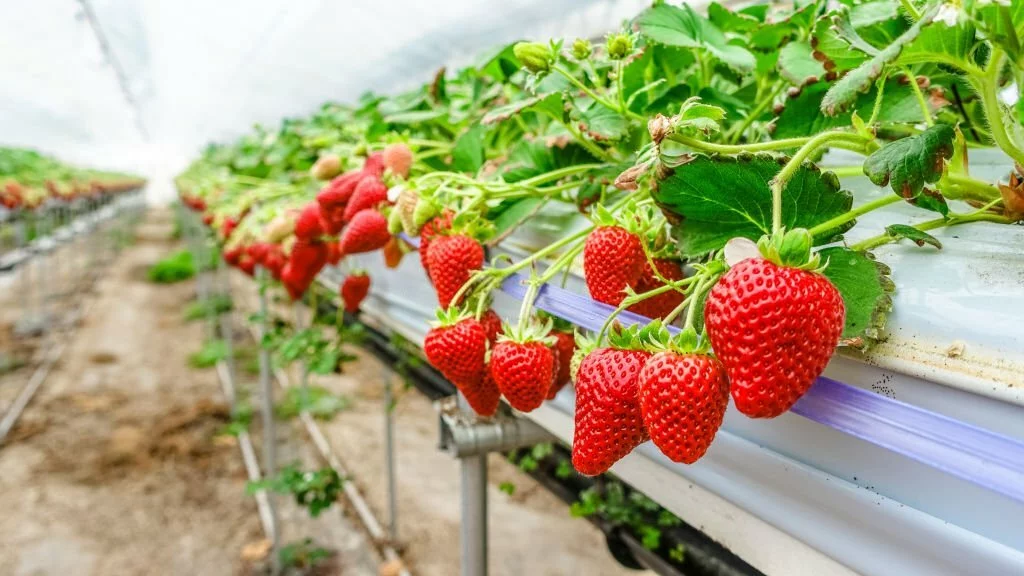In the modern era of conscious consumerism, the demand for organic produce has experienced a remarkable surge. The allure of organic fruits and vegetables lies not only in their nutritional benefits but also in the environmentally friendly and sustainable farming practices that underlie their cultivation. However, as the methods of food production evolve, so do the debates surrounding what can truly be classified as “organic”. One such debate centers around the cultivation of hydroponic strawberries. Hydroponics, a soil-less farming method, presents a paradox in the realm of organic farming. In this exploration, we embark on a quest to answer a pivotal question: Are hydroponic strawberries truly organic? To unravel this complex issue, we will begin by defining the core principles of organic farming, establishing the benchmark against which hydroponic practices will be scrutinized.
- Growing System: 60 Pods Indoor Garden Hydroponics Growing System with 32L Water Tank
- Fast Growth: 3X Faster Growth and 40% Higher Yields with Hydroponic System
- Smart Features: Quiet Water Circulation System and Smart Socket for Easy Setup
- Full Spectrum Lighting: Full Spectrum Grow Light with Adjustable Height for Different Growth Stages
- Easy Assembly: Simple and Smart Design with Universal Wheels for Convenient Movement
Defining Organic Farming
Organic farming is far more than a buzzword; it represents a steadfast commitment to agricultural practices that align with the preservation of our planet’s ecosystems and the promotion of human health. At its core, organic farming adheres to a set of fundamental principles. Organic farmers abstain from using synthetic fertilizers and pesticides, opting instead for natural alternatives. Soil quality is paramount, with the focus on nurturing the soil’s health and fertility through organic matter and compost. Genetic modification is a strict no-go in organic farming, and instead, organic farmers select seeds and plant varieties that are well-suited to their environmental conditions. Biodiversity is celebrated, as organic farms often integrate various crops and animals to create a harmonious ecosystem. Sustainability and resource conservation are at the heart of organic farming, as it seeks to minimize environmental impact and promote long-term soil health. By these principles, organic farming embodies a holistic approach to sustainable food production, with a strong emphasis on soil-based cultivation. It is against these principles that the organic status of hydroponic strawberries will be evaluated.
Hydroponics
To ascertain whether hydroponic strawberries can be classified as organic, it’s crucial to comprehend the nuances of hydroponic farming. Hydroponics is a soil-less cultivation method that relies on nutrient-rich water solutions to nourish plants. In this innovative system, plants grow in a controlled environment, often in containers or hydroponic systems that support them without soil. The essential nutrients that plants require are dissolved in water and delivered directly to the roots, ensuring precise control over the plants’ diet. The controlled environment allows for optimal temperature, humidity, and light conditions, reducing the reliance on synthetic pesticides and herbicides. It’s important to note that hydroponics offers efficient resource utilization, including significantly lower water consumption compared to traditional soil-based farming. Yet, the absence of soil in hydroponic systems poses a significant challenge in the context of traditional organic farming, where soil health and quality are paramount.
- High Yield and Quality: Soilless cultivation with nutrient film can meet the production potential of crops; Compared with traditional soil cultivation, the yield can be doubled with requiring less water and less space
- With Timer to Save Effort: This hydroponic growing system kit of PVC has a timed circulation system; The default setting of the timer allows the pump to work for 5 minutes every 30 minutes to reach the nutrient film technique; The circulation mode can also be set manually or automatically according to demand; Not only makes the pump more durable, saves nutrient solution, but also makes vegetables grow better
- Easy to Assemble & Use: This hydroponic gardening system is extremely simple to assemble and use; Great for beginners and no experience required; It is easy to save time and energy with no arable land required, which means it’s suitable for indoor and outdoor
- Durable and Widely Applicable: Each food-grade PVC-U pipe is 31.1 inches long and 2.8 inches in diameter with 108 sites for vegetables, flowers and plants; The hydroponics growing system kit of PVC for indoor and outdoor is especially suitable for leafy vegetables in home and offices, such as lettuce, rape, celery, beets, bell pepper, garlic seedlings, canola and so on
- What You Get: The plant germination kit has 3 layers; Comes with 1 set of planting pipes, 1 water pump timer, 1 water pump, 1 tube, 1 power plug, planting basket and sponge, 1 tweezers, 3 instructions (planting instructions, assembly instructions, timer instruction manual) and 1-year warranty
Organic Certification Standards
For a farming method or product to be deemed “organic,” it must adhere to strict certification standards established by organizations like the United States Department of Agriculture (USDA). These standards encompass a range of criteria, including soil quality, the use of organic seeds, and the exclusion of synthetic chemicals such as fertilizers and pesticides. Organic certification often hinges on the principle of soil-based cultivation and the promotion of biodiversity within the agricultural ecosystem. These standards are designed to ensure sustainable, environmentally responsible farming practices that prioritize human health, soil health, and the health of the ecosystem at large. The specific criteria for organic certification differ from region to region, but adherence to these principles remains a fundamental requirement.
Hydroponic Strawberry Farming Practices
Hydroponic strawberry farming involves several unique practices. In hydroponic systems, strawberries are cultivated without soil, with their roots immersed in nutrient-rich water solutions. The controlled environment minimizes the need for synthetic pesticides and herbicides, relying instead on integrated pest management techniques. While some hydroponic operations may use organic nutrient solutions, the absence of soil and the potential for non-organic nutrient solutions raise questions about the adherence to traditional organic standards. Additionally, the debate over whether hydroponic farming practices align with organic principles centers on the implications of soil-less cultivation and the variation in certification standards applied by different organic certifying bodies. Evaluating whether hydroponic strawberries can be classified as organic requires considering these distinctive farming practices within the broader context of organic farming principles and certification standards.
The Organic Debate
The classification of hydroponic strawberries as organic sparks a vigorous and ongoing debate within the realm of organic farming. Proponents argue that the reduced reliance on synthetic pesticides, efficient water management, and controlled nutrient delivery make hydroponic farming more sustainable and environmentally friendly than conventional agriculture. They suggest that these methods contribute to healthier plants and reduced environmental impact. However, opponents contend that hydroponic systems lack the foundational element of organic farming: soil. They argue that the absence of soil in hydroponic systems raises questions about the preservation of soil health and biodiversity, two cornerstones of organic farming. Furthermore, the potential use of non-organic nutrient solutions in hydroponics challenges the commitment to organic principles. The debate continues to evolve as organic farming adapts to innovative techniques and technologies like hydroponics.
The Role of Certification Bodies
The stance on hydroponic farming’s organic status varies among different organic certification bodies. Some certifying bodies embrace hydroponic cultivation within their organic standards, provided certain criteria are met, such as the use of organic nutrient solutions. In contrast, other certifying bodies maintain a more traditional approach, arguing that soil is an indispensable element of organic farming. This divergence in perspectives can create confusion for consumers seeking organic produce. Transparent labeling is essential to inform consumers about the methods of production and the standards upheld by different certification bodies. It also empowers consumers to make informed choices regarding the organic produce they purchase.
Conclusion
The classification of hydroponic strawberries as organic is a complex and evolving issue, influenced by differing perspectives, regional regulations, and the ongoing development of farming practices. While hydroponic farming offers undeniable benefits in terms of resource efficiency and reduced pesticide use, it also challenges traditional notions of organic farming by omitting soil. Ultimately, the determination of whether hydroponic strawberries are truly organic may depend on one’s interpretation of organic principles and the specific certification standards upheld by various certifying bodies. As consumers, being informed about how our strawberries are grown allows us to make conscious choices based on our personal preferences for organic produce. Whether you favor the innovative methods of hydroponics or adhere to a more traditional view of organic farming, the quest for organic strawberries remains an exploration of taste, principles, and environmental considerations.






